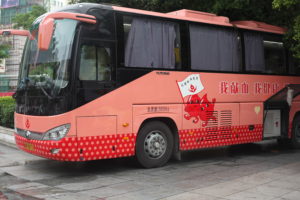November 19th will be our first thalassemia outreach activity day in China. Ever since we met with the two local organizations comprised of parents trying to provide proper care for their biological children with transfusion dependent thalassemia, more information about the current situation has emerged. We are hopeful that the activity day will enable parents and children to come together for support and fun while enable planning for improvements in thalassemia care in this particular region of China.
Historically, there has been a blood shortage in Guangxi. Many adoptive parents learned about this after seeing shockingly critical hemoglobin levels in lab work of their soon to be children. Over the past few years, the situation has improved especially with some education and assistance to orphanages to ensure regular transfusion care. Some families with biological families (and now many orphanages) have found direct donors. For biological families, the number of families who are able to secure direct donors for their children is very low. Without a direct donor, the child must wait in a “line” at a hospital for transfusion. This line can be up to 3 or 4 MONTHS long, especially for a child with blood type O. Waiting this long for blood which is needed by most transfusion dependent children every 21 days has significant adverse health consequences, including the risk of death.

the blood bus, a blood donation station.
Unfortunately, Guangxi continues to be an area in China with very high numbers of people who are carriers of the thalassemia trait/minor gene which results in a high number of children who are born with transfusion dependent thalassemia. In one area we are working in, there are over 400 children with transfusion dependent thalassemia (within an approximate 30-40 mile radius). These children are from regular families who love their children dearly and desire to provide the best medical care they can. Back in June, we heard stories of the financial toll of paying for regular transfusion care, sporadic chelation, and typically recommended splenectomies. Families using all their savings and borrowing from friends and family members to pay for their children’s care. Families trying to have a healthy sibling for a chance at cure through bone marrow transplant. Families splitting up due to the stress and pressure of having a child with a chronic health condition and living with hands tied by an inability to provide for the child. Families bound by inaccessibility to treatment due a shortage of blood donors. Families living with hope lost.
We are incredibly humbled and grateful for the opportunity to outreach to these families. We are excited to work alongside the effort to promote awareness of thalassemia and the need for blood donors. And we are firmly committed to do all we can to bring hope to families with children with transfusion dependent thalassemia.
Would you be willing to join us in our effort?
Knowing Hope, one life at a time.